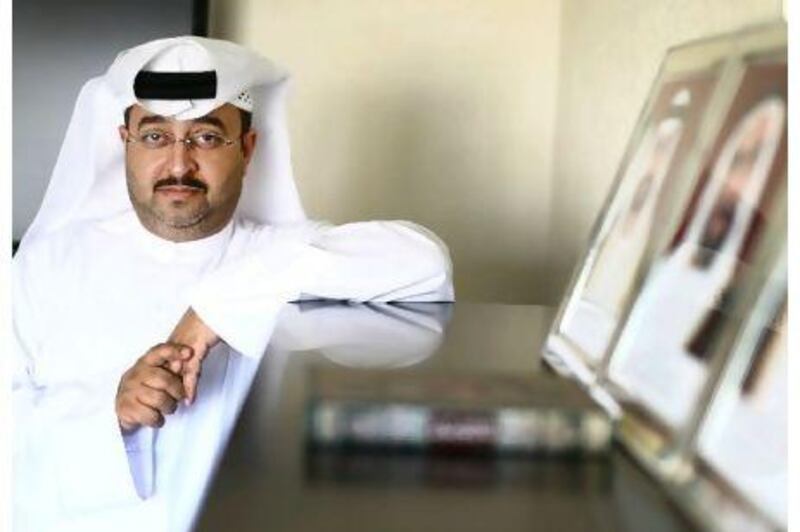ABU DHABI // An overhaul of the nation's drug laws could mean offenders no longer face prison sentences.
Anti-drugs officials told The National that Sheikh Saif bin Zayed, the Minister of Interior and Deputy Prime Minister, had ordered all concerned authorities to evaluate current anti-drugs laws and suggest reforms.
Generally, the overhaul will consider new methods to punish or treat convicts, especially repeat offenders, such as social and community services.
Brig Gen Maktoum al Sharifi, the head of Abu Dhabi Capital Police, welcomed the idea of reforms, saying the law should not consider a drug offender a criminal, as it currently does.
"A drug addict is a sick person and he should be treated as such," Brig Gen al Sharifi said. "Alternative punishment would be more effective. A drug offender could be just an addict, not a criminal, but after locking him up for years he could come out involved in crimes such as stealing, drug dealing, et cetera."
Alternative punishments police have proposed include community service, such as cleaning the streets, schools or voluntary work. Major reforms proposed by rehabilitation centres include allowing family members to turn in drug offenders to avoid prosecution. Currently, only if abusers themselves seek rehabilitation will they avoid going to jail.
"Addicts would be under the influence of drugs and would not think clearly, so those around them should be allowed to help them," said Dr Hamad al Ghafiri, the general director of the National Rehabilitation Centre (NRC) in Abu Dhabi. "We want to encourage people to seek treatment, so we should assure them that they will not face prison for doing so."
Another major reform, Dr al Ghafiri said, would be the creation of a data-tracking system that would link clinics across the nation to avoid prescription "shopping". He said many patients had used old prescriptions for addiction-treatment medicines provided by the NRC to obtain extra doses by visiting different clinics across the country. Abu Dhabi, he said, had already linked its clinics and pharmacies.
Experts said drug offenders were usually treated as criminals rather than victims, or even patients.
Saeed Abdul Baseer, the Chief Justice of Abu Dhabi Criminal Court of First Instance, said that he would prefer to send patients to rehabilitation centres or give them lesser sentences, but that he was restricted by the law. The minimum sentence for drug crimes is four years - a regulation especially punitive to expatriates who cannot be admitted to rehabilitation centres.
"I would be very happy to give them a lesser sentence or send them to rehabilitation centres," the chief justice said. "It is not an easy thing to sentence a young offender to four years in prison. But I have to follow the law."
Faiza Moussa, a lawyer who deals with drug cases, said jail sentences were not an effective deterrent.
"Drug addiction is more of a psychological problem," Mrs Moussa said. "I dealt with defendants who lapsed too many times. They go to prison and then they are released, they would not have been properly coached or rehabilitated."
She suggested toxins should be removed from the body of drug offenders before considering any punishment. After removing toxins, she said, the offender should be referred to a specialist, who would try to turn them away from lapsing back into drug use. She also suggested jails should have workshops to train inmates on how to be a productive member of society after leaving prison.
"Most of the drug addicts are either unemployed, uneducated or with social problems," she said. "If they teach him a certain profession to start a business after they leave prison, I think most of them would not return to drugs."
[ hdajani@thenational.ae ]
The danger of prescription pills
The most common drugs seen by National Rehabilitation Centre (NRC) officials lately are prescription pills that have been tampered with to alter the effect, officials say.
"Before, the most common cases were hashish and heroin, but there is a new trend now where some of the well-known medical pills are manufactured illegally," said Dr Hamad al Ghafiri, the general director of the NRC in Abu Dhabi.
He said the medicines were formulated differently, giving them properties much different from what their prescription equivalent would be.
"Drug dealers take advantage of this and smuggle these pills to the country to sell them," he said. "They could cause spasm and there were cases where people died from them on the streets or at their homes."
An International Drug Policy Consortium held by the NRC today and tomorrow will help identify such types of illegally produced medicines across the world.
"The ones sold here are different from the ones sold in North or South America," he said. "So, through interacting with international experts at the symposium we will be able to identify more of these types." In terms of abuse of legal substances, the age at which people start smoking has decreased from 17 or 19 to 12 or 13, he added.
* Haneen Dajani







